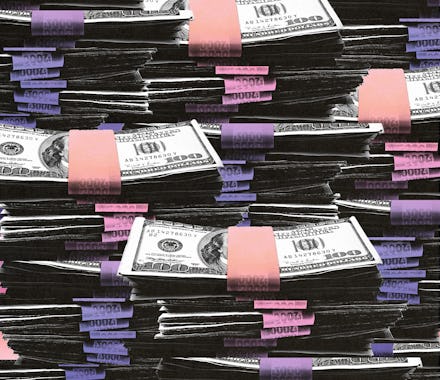3 crucial tax tips to help queer people thrive
Yes, tax season is different for LGBTQ+ people. Financial advisors gave us their best advice for our unique needs.

I feel resentful about the phrase “tax season.” Taxes do not hold the same weight as cuffing or Hot Girls, so dealing with financial paperwork shouldn’t get its own season. Unfortunately, though, taxes are often so confusing that it really does take the length of a season to figure out how to do them, especially if you’re queer. Queer people, it turns out, have their own set of gay financial concerns that our cis-het comrades do not. I asked financial advisors for tax planning tips for queer people to make it all a little easier.
Know your tax bracket
“With marriage [equality], in many respect, the tax filing landscape has been leveled between same-sex couples and opposite couples,” says David Rae, a certified financial planner in Palm Springs. In other words, now same sex married couples have to file as married, but they can choose to file jointly or separately. Although filing jointly may seem like some kind of government-sanctioned validation, it may not make the most sense for you, tax-wise.
All of the financial advisors I spoke to for this article said that one of the most important things you need to do if you’re considering filing taxes with a partner is figure out your tax bracket. If, for example, you both make pretty low incomes, filing together may not make a difference in your bracket. But if one person in a relationship makes significantly more, it may make sense to file separately so that you’re not both paying at the higher earner’s tax bracket level.
Stop itemizing everything
You may be able to deduct things like the cost of gender transition related care that you pay out of pocket. This can include: surgery, reproductive health care, abortion, and HIV-related care. But, you may not want to. “When we itemize, we are reducing the taxes we owe by your applicable tax rate only on the amount over the personal standard deduction,” explains Brad Biren, a tax law attorney in Des Moines.
Biren explains what that means in practical terms: If a single head-of-household who makes about $250,000 a year gets gender affirmation surgery, they will only be able to deduct the expense over the amount of the standard deduction, which is $18,800 at that income level.
“There is a pathway to deduct medical expenses for gender-confirmation surgery through itemization,” says Biren. “Yet, that may not be the most efficient means by which to deduct the expense.” So, what should you do instead of itemizing? Take the standard deduction. Again, this is why you need to know your tax bracket — it also determines your standard deduction.
Know your state tax rules
Generally, state tax rules mirror federal rules, says Biren, but that’s not always the case. “Many states, such as Arkansas, Louisiana, and New York have unique tax systems that would actually, at times, tax you on your deductions and credits,” says Biren. If you have a complicated tax situation — a lot of assets and deductions — you really need to talk to a tax professional in your state to make sure you’re filing for things like the costs of gender affirmation surgery correctly.
Biren recommends assuming yourself to be part of the mainstream when it comes to taxes. “Being part of the mainstream will encourage LBTQIA+ people to pay more attention to general tax information and improve their financial literacy,” he says. I really feel this. For so long, I have ignored learning about the whole financial landscape because I just felt like money and taxes were for straight normies. At some points in history, that perspective might have made sense, but it’s kind of outdated now.
“On average gay and lesbian couples make more than heterosexual couples,” says Rae. “With that higher-income comes a larger tax burden. Keep in mind we are still paid less for the same work, but we are more likely to be dual-income households.” The tax code, Rae explains, is meant to support the nuclear family, husband and wife with a few kids. “This can leave many LGBT couples feeling penalized,” says Rae. But for better or worse, the closer queers get to legal and financial equality in the U.S., the more educated about finances we have to be.